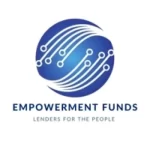Imagine you have a big business idea and the drive to make it happen. But, your credit score is just 450. You might think no one will lend you money. But, the truth is different.
At Empowerment Funds, we think bad credit shouldn’t stop you from getting the money your business needs. We’re here to help entrepreneurs like you, no matter your credit history. We offer financial solutions that help you reach your goals.
Looking for a loan from $5,000 to $10 million or a line of credit from $1,000 to $150,000? Our team will help you. We know your credit score is just one part of the story. That’s why we work with lenders who see your business’s true potential.
Don’t let your credit score hold you back. Start a new journey with Empowerment Funds. We’ll help you get the financing you need and write your success story.
Key Takeaways
- Empowerment Funds provides tailored financial solutions for businesses, including business loans and merchant processing.
- Alternative lenders offer more flexible financing options for businesses with bad credit, with minimum credit score requirements as low as 450.
- Your credit score, ranging from 300 to 850, is not the sole determinant of your eligibility for financing.
- Bad credit typically refers to credit scores below 629, but there are various financing solutions available to help you overcome this challenge.
- Empower your business dreams and unlock your full potential with the support of Empowerment Funds.
Understanding Bad Credit Business Financing
Getting business financing can be tough, especially for those with bad credit. But, bad credit doesn’t mean you can’t get the money you need. Let’s look into bad credit business financing and clear up some myths.
What Does Bad Credit Mean?
Bad credit usually means a FICO score between 300 and 629. These scores come from payment history, debt-to-income ratio, and credit types. Even with a low score, getting traditional financing isn’t impossible.
Why Bad Credit Matters for Business Financing
Lenders often look at personal credit scores when you apply for business loans. They see it as a sign of your debt management skills. Businesses with bad credit might face higher rates, shorter terms, or approval issues for unsecured business loans with bad credit or merchant cash advances for bad credit.
Common Misconceptions About Bad Credit
Many think bad credit means no financing at all. But, this isn’t true. While traditional lenders might be cautious, invoice financing for businesses with poor credit might be an option. Some lenders also look at the business’s potential, not just the credit score.
Another myth is that you need perfect credit for all loans. But, many lenders are open to businesses with various credit levels. They just need to show they can repay the loan.
Knowing the truth about bad credit financing can help entrepreneurs feel more confident. They can then explore their options and get the funding they need to grow their business.
My Personal Journey with Bad Credit
As a small business owner, I’ve faced many ups and downs with financing. Bad credit made things tough, with loan rejections and dreams of growth fading. It was a hard lesson, showing me the true state of my finances.
The Initial Struggles I Faced
At the start, I didn’t know how crucial a good credit score was. My mistakes, like missed payments and maxed-out cards, hurt my credit. This made getting bad credit equipment financing and business lines of credit for subprime credit very hard.
Learning From My Mistakes
It was a tough time, but I took responsibility. I studied my finances to understand my errors. I also got help from credit counseling, which taught me how to improve my score and win back lenders’ trust.
Finding Hope in Hard Times
Even with setbacks, I kept my goals in mind. I looked into bad credit equipment financing and business lines of credit for subprime credit for businesses like mine. With each success, my confidence grew.
This journey has taught me a lot. It made me stronger and more determined. It also inspired me to help others facing similar issues.
“The journey of a thousand miles begins with a single step.” – Lao Tzu
Options for Bad Credit Business Financing
Getting funding for your business can be tough, especially with bad credit. But, there are many options to help you get the money you need to grow. These options can help you overcome bad credit and achieve your business goals.
Alternative Lenders: A Viable Choice
Alternative lenders are a great option for business funding solutions with low credit scores. They are more flexible with credit requirements. This makes them a good choice for businesses with credit issues. They offer different types of loans, like short-term loans and lines of credit, designed for entrepreneurs.
Secured vs. Unsecured Loans
When looking at non-traditional financing for businesses with credit challenges, you’ll see secured and unsecured loans. Secured loans need collateral, like equipment or property, to lower the lender’s risk. But, they also mean you could lose your assets if you can’t pay back the loan. Unsecured loans don’t need collateral but might have higher interest rates.
Crowdfunding: Is It Right for Me?
Crowdfunding is another option to think about. It lets you raise money from many people, often without needing good credit. Sites like Kickstarter and Indiegogo help entrepreneurs share their ideas and get funding. Crowdfunding is great for startups or businesses with unique products or services.
Getting business funding with bad credit might take some effort and creativity. But, with the right approach and resources, you can make your business dreams come true. Look into different options and talk to financial advisors for help.
At Empowerment Funds, we know how hard it is to find business funding solutions with low credit scores. Our team offers custom financial solutions, like business loans and merchant processing. Ready to move forward? Visit empowermentfunds.com or call 833-902-6430 to get funded today!
Preparing to Apply for Financing
Starting a business with bad credit can feel tough. But, with the right steps, you can get the funding you need. Let’s look at how to prepare for the application process.
Assessing Your Current Financial Situation
First, check your financial health. Look at your credit score, which lenders care about a lot. A score of 600 or less is considered bad for small business loans. Knowing your score helps you see where you can improve.
Also, check your business’s money matters. Look at your income, cash flow, and debts. This info helps you find the right financing for your business.
Gathering Essential Documents
Lenders need many documents to review your application. These include bank statements, tax returns, and financial plans. Get these ready early to make the application smoother and show you’re ready.
Crafting a Compelling Business Plan
A good business plan is key when applying for loans. It should outline your goals, market, finances, and how the loan will help grow your business. A strong plan can show lenders your business’s potential, even with bad credit.
By understanding your finances, getting your documents in order, and writing a solid business plan, you’re ready to apply for financing. This will help you achieve your business dreams.

“Preparation is the key to unlocking the door to financing opportunities, even with a less-than-perfect credit profile.”
Improving My Credit Score
As an entrepreneur with bad credit, I face many challenges getting business financing. But, with the right steps, you can improve your credit score. This opens up new funding opportunities. Let’s explore some simple ways to boost your credit score fast.
Simple Steps to Boost My Credit Fast
- Make payments on time: Payment history is key to your credit score. Pay all bills, like utility and credit card balances, on time.
- Reduce credit utilization: Keep your credit card balances low, below 30% of your limit. This shows lenders you manage credit well.
- Dispute credit report errors: Check your credit reports often and fix any mistakes. This can quickly improve your score.
Credit Repair Services: Are They Worth It?
Credit repair services can be helpful, but be careful. Good agencies help fix report errors, but avoid those promising to remove accurate info. Research well and pick a service with a good reputation.
The Role of Credit Counseling
Credit counseling is great for businesses with bad credit. Nonprofit groups offer advice on debt, budgeting, and improving finances. They might also talk to creditors for you or help with debt plans. Counseling is a strong tool for financial freedom.
Improving your credit score takes time and effort, but it’s worth it. By using these strategies and getting professional help, you can find better business funding solutions with low credit scores. This can lead to your business’s success.
Building Strong Relationships with Lenders
Getting financing for your business, especially with unsecured loans or merchant cash advances for bad credit, is more than just filling out a form. It’s about building strong relationships with lenders. Being confident and keeping the lines of communication open can really help. This way, you’re more likely to get the funding you need to grow your business.
How to Approach Lenders Confidently
Before meeting with lenders, know your business inside out. Understand your financing needs and your credit history. Be ready to share how you plan to use the money and how you’ll improve your credit score. Lenders like OnDeck offer flexible repayment plans up to 24 months, which can help with cash flow.
Always be professional and show your commitment to the partnership. This will make a good impression.
The Importance of Communication
Keeping your lender in the loop is key. Share updates on your business, including any challenges or changes that might affect repayment. Addressing issues early on can strengthen your relationship and build trust. Lenders prefer borrowers who are open and honest about their finances.
Understanding Loan Terms and Conditions
Before you sign anything, make sure you understand the loan terms. This includes the interest rate, repayment schedule, and any fees. Think about how these will affect your business’s cash flow and overall health. Knowing the terms helps you make smart decisions and negotiate better with the lender.
Building strong relationships with lenders is vital for getting the financing you need. By being confident, keeping communication open, and understanding the loan terms, you can open up new opportunities. This will help take your business to new heights.
Empowering Others with Bad Credit
I’ve faced the tough side of poor credit in my business journey. I’m eager to help others who are going through the same. My story shows that no matter how tough it seems, there’s always a way forward.
Sharing My Story to Inspire Others
I share my personal journey to offer hope and advice to business owners with bad credit. I talk about my early struggles, what I learned, and how I found ways to finance my business. My story proves that with hard work and the right help, you can succeed, even with bad credit.
Resources and Support Groups Available
- Online groups and mentorship programs connect you with people who understand your challenges. They offer advice and support.
- The Small Business Administration (SBA) helps with bad credit loans and guidance.
- Alternative lenders offer business lines of credit for subprime credit and invoice financing for businesses with poor credit. They can be good options.
Tips for Staying Positive Throughout the Process
- Focus on your progress, no matter how small. Celebrate your wins.
- Learn from your mistakes. Use them to improve your financial skills.
- Remember, many successful businesses started with credit issues. Your determination and resilience are key.
Overcoming bad credit in business is tough, but it’s doable. I share my story, connect you with resources, and offer tips. My goal is to empower you to achieve financial freedom and success.
Moving Forward: Achieving Financial Freedom
Looking back, I’m focused on setting realistic financial goals. I aim to improve my credit score, boost revenue, and build an emergency fund. I’ll track my progress and celebrate each success.
Setting Realistic Financial Goals
Setting clear, achievable goals is key. This could mean increasing revenue, paying off debt, or improving my credit score. With these goals, I can create a plan and stay motivated.
Tracking My Progress Over Time
It’s crucial to keep an eye on my financial progress. I’ll check my credit reports, track my income and expenses, and use financial tools. This helps me see where I can improve and make smart decisions.
Celebrating My Successes, Big and Small
Celebrating both big and small wins is important. Whether it’s getting my first non-traditional loan or a small credit score boost, I’ll celebrate. These moments keep me inspired and motivated to reach my goals.
FAQ
What does “bad credit” mean?
Bad credit means your FICO score is between 300-629. Lenders look at your personal credit score when you apply for a business loan. They check your payment history and how much debt you have compared to your income.
Why does bad credit matter for business financing?
Bad credit can make it hard to get a loan and might mean higher interest rates. But, some lenders focus more on your business’s future than your past credit.
What are some common misconceptions about bad credit?
Some people think you can’t get any funding with bad credit. Others believe you need perfect credit for all loans.
What are the initial struggles faced with bad credit business financing?
Entrepreneurs often face loan rejections and few options at first. It’s important to learn from your financial mistakes to get better.
What strategies can help overcome bad credit for business financing?
To beat bad credit, you can offer collateral, get a co-signer, or look into alternative lenders.
What are some alternative financing options for businesses with bad credit?
Alternative lenders offer short-term loans, lines of credit, and working capital loans. Secured loans need collateral, while unsecured loans might have higher rates.
How can I prepare to apply for business financing with bad credit?
First, check your finances, collect important documents, and write a strong business plan. To improve your chances, offer collateral or find a co-signer.
What steps can I take to improve my credit score?
Pay bills on time, lower your credit use, and fix any credit report errors. Credit repair services and counseling can also help.
How can I build strong relationships with lenders despite my bad credit?
Be confident when talking to lenders, keep communication open, and understand loan terms. Some lenders offer flexible repayment plans to help with cash flow.
What resources are available for business owners with bad credit?
There are online communities and business mentorship programs for support. Sharing your story can inspire and guide others with similar challenges.






